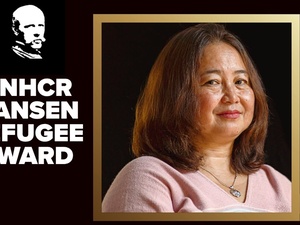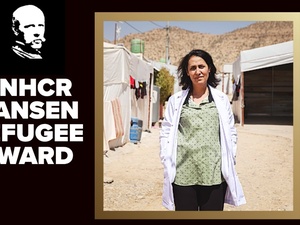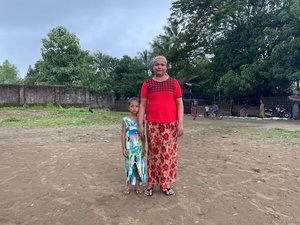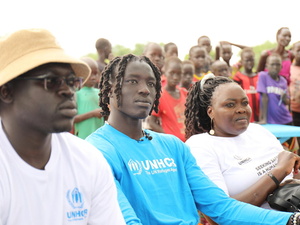Q&A: UNHCR coordinator for Mali crisis hopes for best, prepares for worst
Q&A: UNHCR coordinator for Mali crisis hopes for best, prepares for worst

Valentin Tapsoba (left with cap) gets a briefing during a visit to a camp in Mauritania.
GENEVA, October 29 (UNHCR) – Since it began in January, the rebellion in northern Mali has driven more than 300,000 people from their homes. Many are seeking refuge in marginally safer areas in the south, while an even greater number have fled to neighbouring countries. Valentin Tapsoba, UNHCR's coordinator for the Mali situation, has spent most of the year overseeing efforts to ensure their safety and protection. He is in charge of a massive relief operation that spans a vast portion of the Sahel, including Algeria, Burkina Faso, Mali, Niger and Mauritania. Tapsoba is based in Dakar, Senegal, but recently visited several European capitals to meet with donors and journalists and make the case for a robust humanitarian response to the Mali emergency. During a stop in Geneva, he spoke with Christopher Reardon, the refugee agency's senior digital editor/writer. Excerpts from the interview:
What are the conditions like for refugees in Burkina Faso, Niger and Mauritania?
One of our biggest concerns is water. In an emergency situation, we should have at least 15 litres per person per day, but in Niger we are under that. In Burkina the average is more or less 17 litres per person per day. We are trying to increase the daily water supply to 20 litres per person – because water is life. If you don't have clean water, you can get cholera and many other diseases.
We have also a big challenge in terms of education. Many students lost the school year 2011-2012. Now we are trying to see with UNICEF [UN Children's Fund] whether we can have a memorandum of understanding signed so that the school year 2012-2013 can go forward. Education is a protection tool, and we don't want students to be sitting idly and maybe being recruited by Ansar Dine or MUJAO, two of the insurgent groups in northern Mali.
What is it that keeps UNHCR from providing enough water?
With water, the first issue is resources. We launched an appeal for US$153.7 million, but so far we have received US$64 million – less than 50 per of the requirement. The second challenge is location. In the Sahel you can drill boreholes, but you may not find water. Even if you find water, it may be too salty and you need to treat it. Or it may not give enough for the refugees, the host communities as well as animals. You see, when the refugees fled to Burkina, for example, they also brought many cattle. You have to give water to the livestock too, because they are an important source of resilience for people.
If water is already in short supply, and education too, what will happen if the fighting in Mali intensifies and more people flee?
Increasingly, it is not a question of whether there will be an intervention by ECOWAS [the 15-member Economic Community of West African States]. The question is when it will it be. We are likely to have a massive outflow of refugees to neighbouring countries – not only to Burkina Faso, Niger and Mauritania but it can even go to Côte d'Ivoire, Guinea and Senegal. So we are preparing contingency plans and so forth so that we will be able to deal with various scenarios. We have to take them to the international community, to raise more funds and raise awareness that the situation is not over. I can say it is just starting.
Is UNHCR playing a role inside Mali as well, helping internally displaced persons, or IDPs?
Yes, UNHCR is playing a role within the [inter-agency] cluster approach in Mali. We are the protection lead, meaning that we are doing the profiling of IDPs so that all of the agencies can have a clear idea of the composition of the family members as well as their place of origin. Furthermore, UNHCR has stockpiled some non-food items in Mopti like sleeping mats, jerry cans, buckets, tarpaulins, kitchen sets, blankets and mosquito nets for distribution to some of the 40,000 IDPs in the Mopti region.
Has there been any indication from governments in neighbouring countries that they would ever turn people back?
The governments of Burkina Faso, Mauritania and Niger have opened their borders, their hearts and their host population to receive the refugees who are fleeing from Mali. These countries have signed the 1951 Refugee Convention, and therefore they will not close their borders. But if there is a military intervention in the north of Mali, Al Qaeda and the terrorists may take the same escape routes as the refugees. This is worrisome for us in the field, because if they close the border they may be blocking the arrival of people who indeed need international protection.
Are you satisfied with the level of media coverage about the Mali emergency?
No, we are not satisfied. When you wake up in the morning and turn on your radio or TV, you find coverage of Syria from the BBC, from CNN, from Al Jazeera. But it is rare that you hear anything coming out from Mali. I know that accessibility is very tough. But one refugee child who is leaving Mali to go to Burkina or Mauritania or Niger has the same essential needs for protection and assistance as a Syrian going to Jordan or Lebanon or Turkey. The refugees from Mali are traumatized, and they should not be forgotten.









